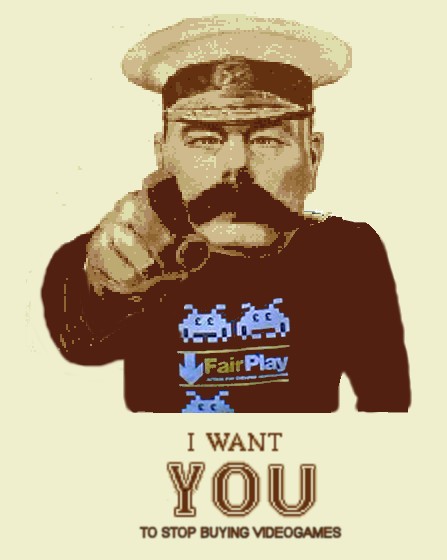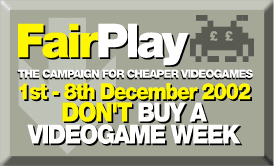 |
||
|
||||||
|
Click to hear FairPlay debate the campaign with ELSPA on BBC Radio 5 Live Breakfast, Sat 7 December. (If this is your first visit to the FairPlay site, click here to read more about the campaign.) |
||||||
|
Our work here is done. |
||||||
|
We've achieved pretty much all we can for now. The FairPlay Campaign did more to bring the issue of rip-off videogame pricing into the public eye than has ever been done before. Attracting coverage in scores of publications (close to 100, in fact), from the smallest website to the largest of national newspapers, games magazines and television and radio broadcasting institutions, over 500,000 people heard our message on this website alone, and millions more through other media, and a massive 85% of poll respondents agreed with us that the current price of games is far too high. The industry's paralysing fear of debating the issue with us (the link above was the only time they dared go head-to-head with the campaign) says more than we ever could about the truth of our claims, but the campaign, despite its thorough vilification by the games industry, was comprehensively vindicated in many other ways too. 1. Nintendo's conviction by the European Court during the campaign, and huge £100m fine, for illegally fixing prices at an artificially high level. 2. The massive waves of price-cutting in the UK during the Christmas season - normally the most lucrative time for videogame sales - which meant practically every game in the release schedules could be bought on the High Street for £10-£15 below the RRP. 3. The big sales blip during the campaign week which saw Game, Europe's biggest videogame retailer, lose a massive 80% of its share value overnight in response to disappointing sales. When the campaign was over, sales shot up again, just as we said they would. 4. A long line of disastrous financial results, redundancies and studio closures among publishers and developers continued to demonstrate the economic unsoundness of the industry's current business model. 5. Huge reductions in the pricing of, particularly, the Xbox and Gamecube, leading to massive sales increases of up to a staggering 5000%. 6. Dixons Group and Game, two of Europe's biggest game retailers, slashing the price of all Gamecube software to between £15 and £25, resulting in enormous sales boosts. 7. And most rewarding of all, the story, reported by IGN, that Nintendo have quietly restructured their licensing fee from a fixed rate to a sliding scale exactly in accordance with the primary demand of the FairPlay Campaign, so that publishers can now sell games at a variety of prices without being penalised for setting lower prices by having to pay the same fixed licencing fee to Nintendo. We look forward to the other hardware companies following suit. We're very proud that the tiny handful of unresourced activists at the FairPlay Campaign have achieved so much so soon against a multi-billion dollar international industry, but there's little else we can do. It's up to you, the videogame consumers, now. Keep refusing to buy games at the rip-off standard prices. Most new titles appear in second-hand sections within a couple of weeks of release - buy them there and save money, instead of boosting sales figures and reinforcing high prices by getting them on release day. Get together with friends and swap games, instead of pointlessly all buying copies of the same big titles. This one tiny application of consumer power has already had dramatically impressive results. Buying a Gamecube, memory card and five top games of your own choice to play on it before Christmas in the UK could have cost you over £350. Just three months later, that same purchase in the same High Street store would cost you just £140. That's the power of consumer action. Keep believing in it. Thanks for your support. |
||||||
|
x |
||||||
 x x |
||||||
|
Want to look this stylish while protesting? |
||||||
|
||||||

